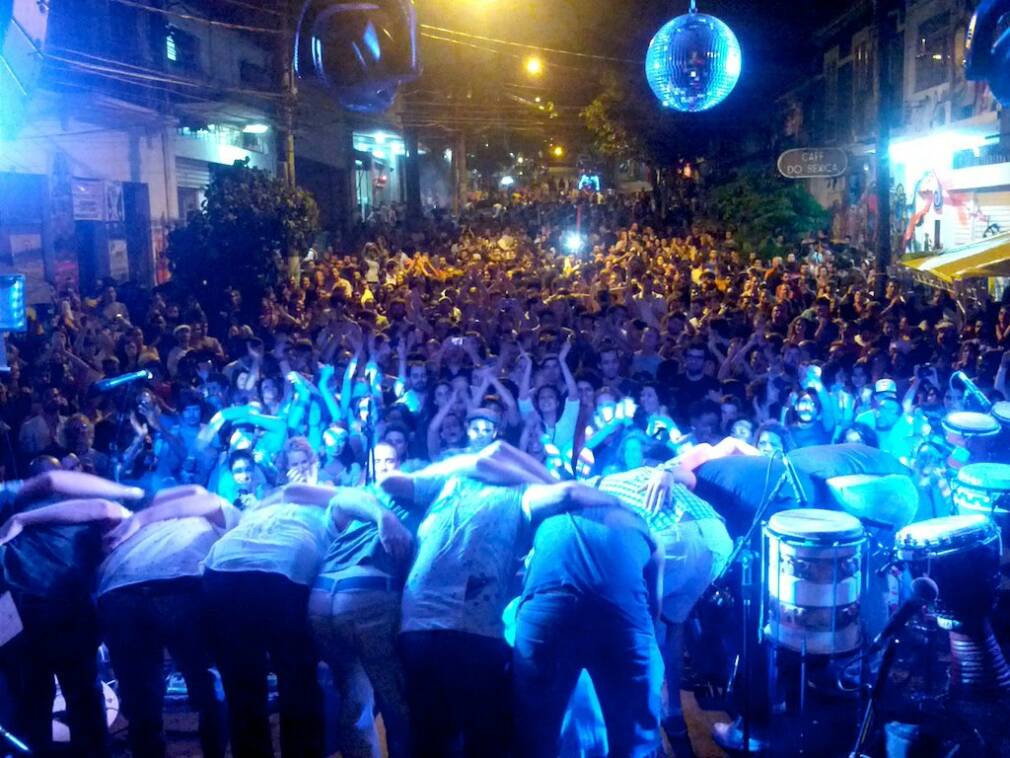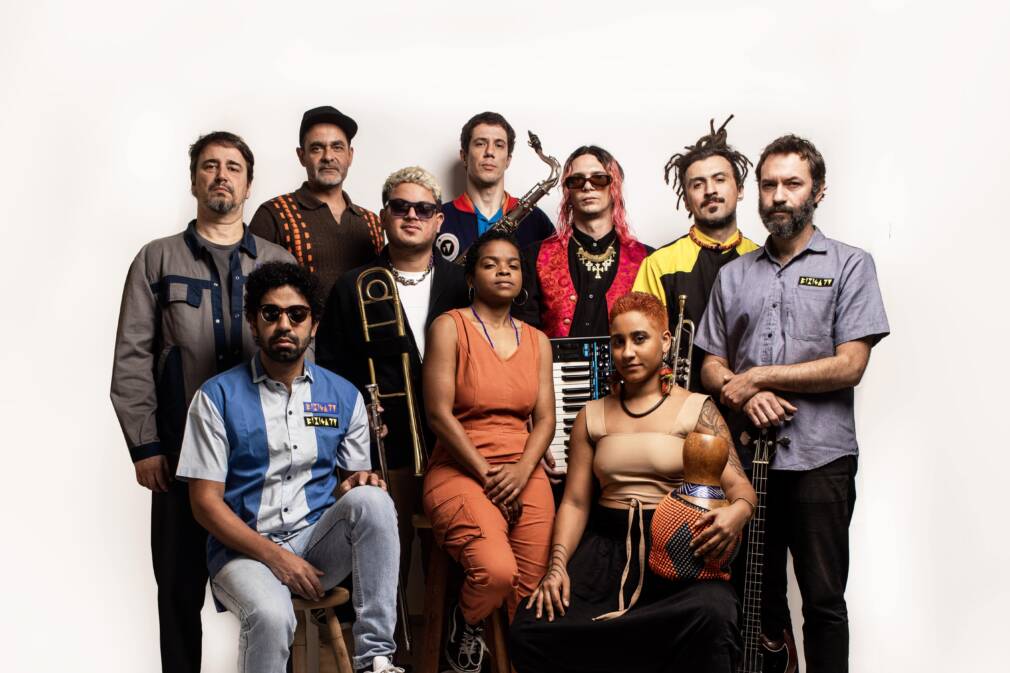Five years after their last international tour, the Brazilians of the Bixiga 70 collective finally returned to European venues to launch their fifth album, Vapor, full of new sounds and influences. The Paulista big band, famous for their festive live shows and their outspoken political stance in favor of freedom, have come a long way.
And Brazil sank…
On October 28, 2018, shame fell on Brazil. Over 57 million voters had elected an obscure, openly misogynistic, racist, homophobic and nostalgic prime minister, Jair Bolsonaro, at the head of the country, whose name would soon travel around the world. In such a context of political chaos and uncertainty about the future, how do you launch a new album and play concerts while continuing to campaign for democracy? That’s the question we put to two of the band’s members between the two rounds of this election, which turned out to be catastrophic for the country. “It’s hard to talk about music at a time like this,” explains saxophonist and founding member Cuca Ferreira. “How can you not feel corrupt when, instead of saving your country, you’re trying to get your record out?”

In 2018, despite a certain international notoriety, Bixiga was still part of the underground. Coming from punk, reggae, rock and electronic projects, all the musicians had lived through the emergence of the new Paulista scene of the 2000s, deeply united against fascism. “Although our music is instrumental,” emphasized Mauricio Fleury, the man with the keyboards, “it contributes to the debate on the future of Brazil, which we would like to see more amplified. It expresses our position.” He added: “Our music is a music of community, of congregation, of friendship, of celebration, everything that today poses a problem.” This festive coloring enriched their fourth opus, Quebra Cabeça (headache), with a few electro layers here and a few Indian percussions there, and marked by elaborate arrangements and an assertive Brazilian identity: carnival, street parties and brass bands.
Occupy São Paulo
Like Rio and Salvador, São Paulo has not escaped the carnival revival in Brazil. In the once deserted streets, millions of people now gather around small improvised stages, promoting human contact, the collaborative system, integration and solidarity with minorities. In the city center, where – after the former slaves – many emigrants settled (Italians, Nordestinians, and more recently Bolivians, Nigerians, and Congolese) the historic Bixiga district, celebrated in particular by Adoniran Barbosa and Elis Regina, lives to the rhythm of these events. Every April 7, on 13 de Maio street, the date of the abolition of slavery, graffiti day takes place, when almost all the buildings on the street are painted white to allow artists to renew their street art.
With its striking slogan “The street belongs to all of us”, the residents’ collective Ocupai Bixiga (Occupy Bixiga, the Brazilian avatar of Occupy Wall Street), whose aim is to turn the neighborhood into a center of cultural effervescence, is behind this great free party, in which the Bixiga have long been active participants. Traquitana, the studio founded by guitarist Cris Cabello, is located at no. 70, 13 de Maio street. This is where the band was born in 2010 and recorded their first three albums, all captured live, without embellishments or additions, including the aptly named Ocupai (Occupy Here), released in 2013, on the eve of Dilma Rousseff’s re-election.
Bixiga are among the fiery musicians who campaigned for the second term of office of Lula’s successor, leading to an all-out brawl at the end of the concert with supporters of military intervention. They took a stand against the institutional coup d’état of 2016, which eventually led to the president’s impeachment. That same year, the band took part in the Music for Democracy movement, alongside artists such as Tom Zé, Tulipa Ruiz, Curumin and BNegão, who occupied the large Largo da Batata park in São Paulo for eight days, mixing street performances and debates around citizenship. At the time of the elections and in the face of the Bolsonaro threat, Cuca Ferreira was stepping up the number of neighborhood meetings: “It had nothing to do with music, we went as citizens to try to convince people, to explain what was happening.” If we hope to raise collective awareness of the meaning of citizenship and democracy, we might as well start with our neighbors.
Resisting Covid and Bolsonaro
Though the name Bixiga 70 comes from the address of their recording studio, it obviously refers to Fela Kuti’s band, Africa 70. The Nigerian icon, whose Afrobeat the band has been peddling since its inception, is their role model in many respects. Mauricio Fleury speaks of him with respect: “He used to say that he transformed the sadness of some into the joy of others, and that’s what we do in our own way too.” On stage, to gain in strength and intensity, the group has always applied the Felakutic principle of a subtle balance between celebration of the collective and apology for freedom, without ever dramatizing. “Fela’s lesson is resistance,” adds Mauricio. “It’s only by remaining free that we can give the best of ourselves.” Unfortunately, this warning did not carry much weight in the face of the calls for hatred from the supporters of the “Trump of the tropics”.
Bolsonaro’s term in office has had a dramatic impact on Brazil. Four years after his naively optimistic words, the list of abuses committed by the former president and his team is endless: embezzlement, assassinations, destruction of culture, health and education, deforestation, stigmatization of minorities – a terrible record, accentuated by criminal management of the Covid pandemic that would throw tens of thousands of people onto the pavement and make Brazil the second most bereaved state in the world, with over 700,000 dead. “It was a really complicated time. We could see the tragedy coming and there was nothing we could do,” admits Cuca. “For someone my age, who experienced the end of the military regime, the return to democracy and a popular government, going back to where we started was very frustrating.” Daniel Nogueira, the second saxophonist, is even more bitter: “Everything I had dedicated my life to was falling apart.“
During the pandemic, venues closed one after the other, due to a lack of audience and therefore, revenue. This disaffection calls into question the raison d’être of bands like Bixiga 70, who depend fundamentally on their live shows. A decade after its creation, the collective has ground to a halt, with each member making do as best he can, giving lessons or working as a session musician. As for Mauricio, mired in a dark history of domestic violence, he has preferred to keep his distance. A bitter way to celebrate 10 years of existence. Feeling that they had reached the end of a cycle, three other instrumentalists also decided to jump ship. Like Brazil, the group was on the verge of dislocation.
Back to Bixiga
At the end of 2022, with Lula’s victory, hope was reborn for Bixiga. The band rekindled its connections and found itself back in the neighborhood, and new musicians were recruited. After believing for a while that they could return to the same project as before, the six surviving members finally came to terms with the fact that the group’s rebuilding depended on the break-up that had almost taken it away, and on remembering its fundamentals. “Bixiga has always been a collective where everyone contributed their ideas,” insists Cuca. “Those who join us must have this same state of mind.” It is precisely by asserting a certain way of making music that the group has forged its personality: playing without preconceived ideas, unlearning with each new encounter. A praise of fascination that was echoed by pianist João Donato, who passed away in mid-July and was a special guest on Quebra Cabeça. “His way of composing had a lot to do with our desire to preserve a certain ingenuity when it came to melodies, to just feel things and let them flow quietly. He’s had a huge influence on us,” says Mauricio Fleury. This time, the salvation of this sound community came from new recruits: drummer Simone Sou, an expert in traditional rhythms, a regular on the paulista scene and familiar with the Traquitana studio; young percussionist Valentina Facury; and the king of electro brega tinkering Pedro Regada, who gives Vapor (vapeur), i.e. “steam”, its name, its name.
“Vapor expresses all that illusion in which we almost dissolved,” sums up trumpeter Daniel Verano, who came up with the title. “At the same time, this vapor is the water of which we are made, which connects us, unites us and makes us strong. This great fragility, which also enables human beings to mobilize to help each other, is what Bixiga 70 is all about.“
Vapor, by Bixiga 70 is available here via Modulor.

